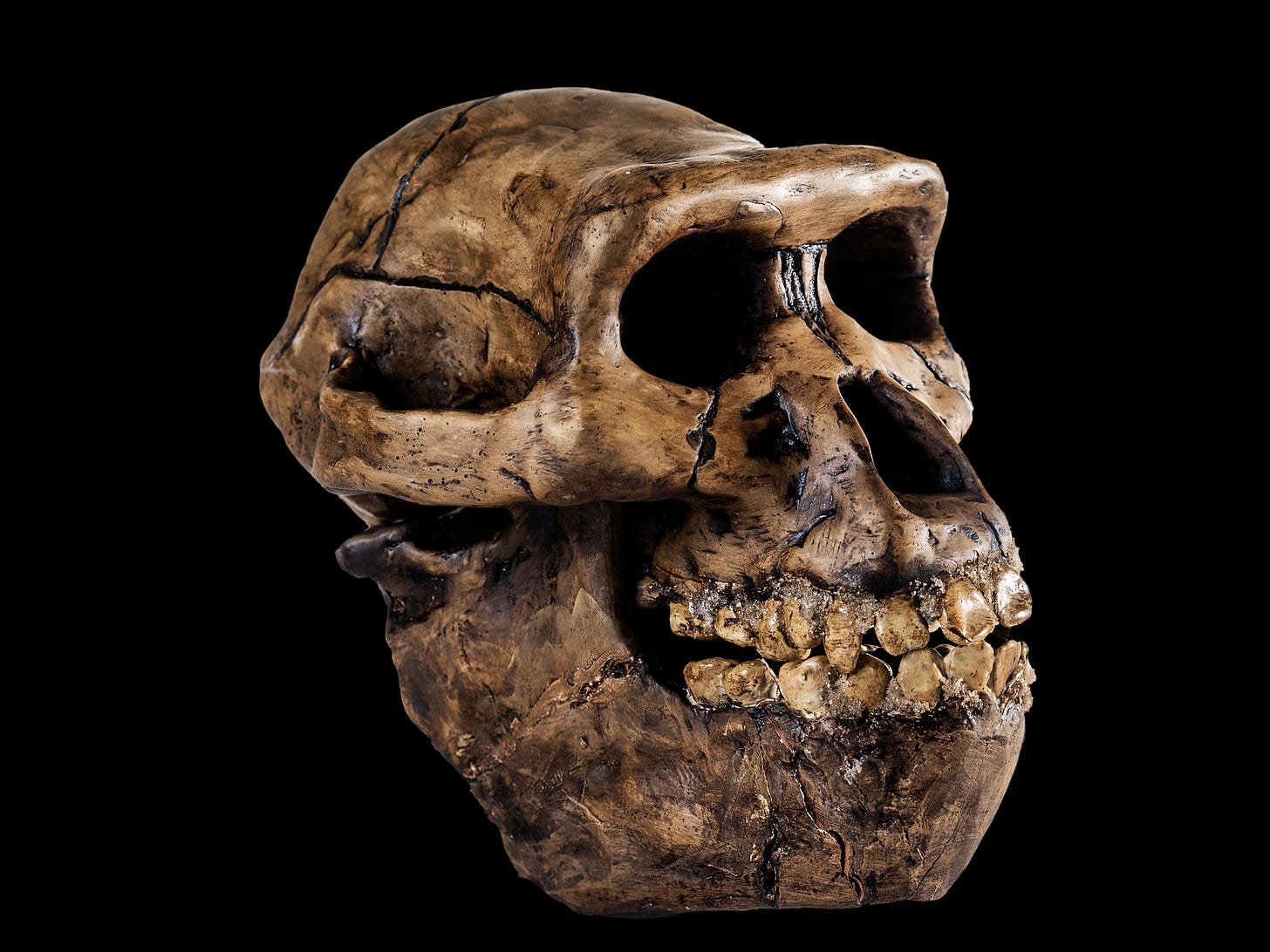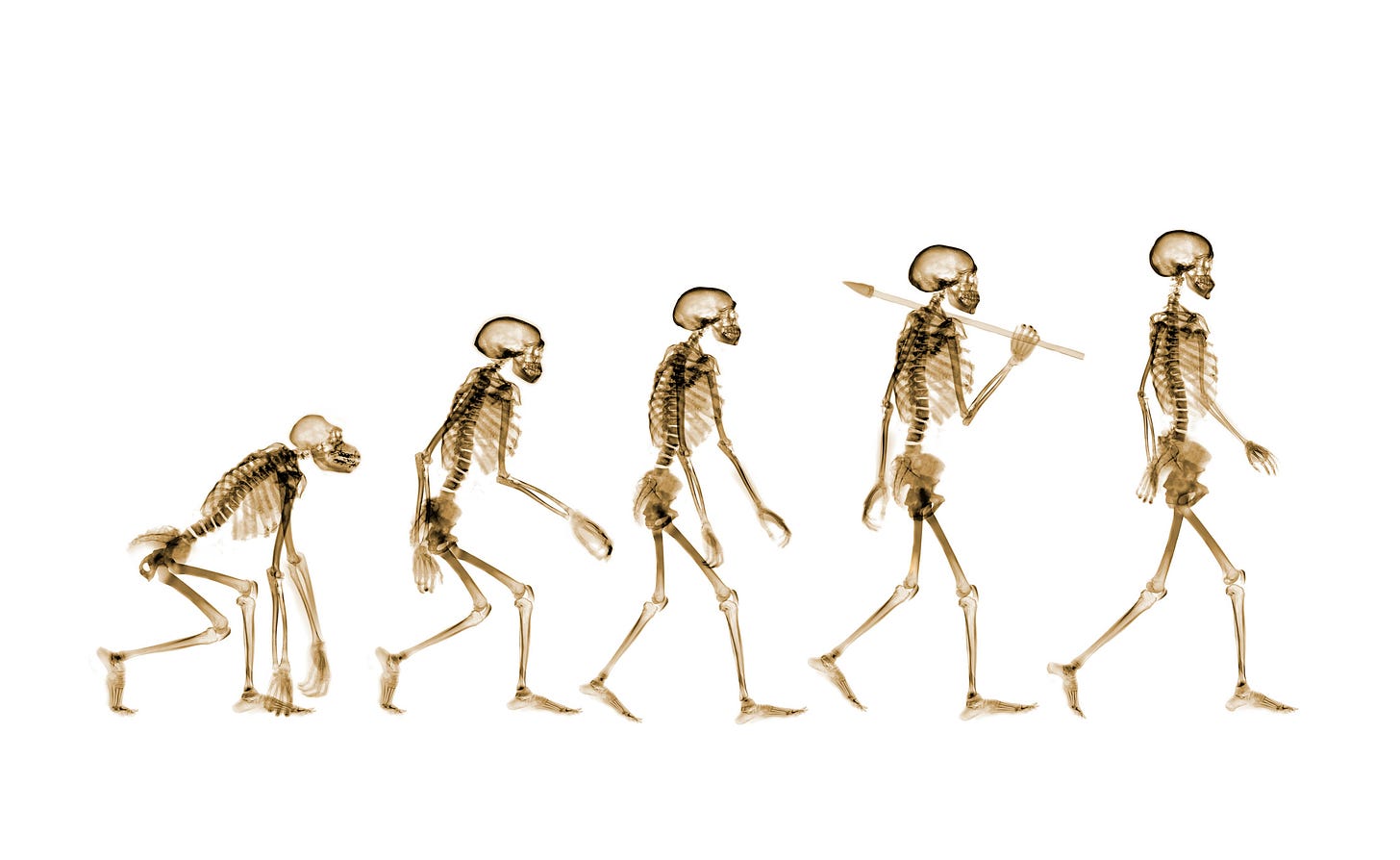Nothing in Evolution Makes Sense, Except in Light of Creation
How religious scientists saved Darwin's theory.
Theodosius Dobzhansky was among the greatest biologists of the twentieth century and one of the chief architects of the Modern Evolutionary Synthesis. His research in genetics and highly influential work, Genetics and the Origin of Species (1937), were key in convincing twentieth-century biologists of the explanatory power of Darwinian natural selection when combined with Mendelian genetics.1 Dobzhansky famously argued that “Nothing in biology makes sense, except in light of evolution.”2 What is less well known, however, is that Dobzhansky was also a devout Eastern Orthodox Christian who simultaneously affirmed that nothing in evolution makes sense, except in light of a Creator God.
At a time when the majority of biologists deeply doubted Darwin’s theory, Dobzhansky, inspired by faith in the Eastern Orthodox understanding of how God works in creation, unambiguously placed his religious hope “in the Kingdom of God conceived of as the goal of evolutionary progress.”3 Deeply rooted in faith in the truth of Biblical creation, Dobzhansky went on to argue for the truth of evolution. Connecting Darwin’s theory of evolution with Mendel’s theory of genetics, Dobzhansky contended that “science and faith [are] not segregated in watertight compartments,” and that “Creation is realized in this world by means of evolution.”4
The Death of Darwinism in the Early 20th Century
By the end of the nineteenth century, Darwin’s theory of evolution via natural selection was essentially dead, and it remained so for the first two decades of the twentieth century. During this period, known as “the eclipse of Darwinism,” the majority of scientists accepted evolution while rejecting Darwinian natural selection as its cause. As historian of science Peter Bowler describes: the “half-century or so following the publication of Darwin’s Origin of Species in 1859 was a period of turmoil in biology” where “evolutionism was accepted quite rapidly…but the programme outlined in Darwin’s book did not find favour.”5
One of the most serious scientific doubts threatening the viability of Darwin’s theory of natural selection concerned the lack of evidence for his understanding of heredity. There was simply no convincing evidence for Darwin’s “pangenesis theory” of heredity which was built upon the idea of 18th-century biologist Jean Baptiste Lamarck that physical traits or characteristics could be acquired through use and disuse and then transmitted to successive generations.
When Mendel’s research and theory of genetics was rediscovered in the early 20th century it was viewed as putting the final nail in the coffin of Lamarckian inheritance theories. The first biologists who rediscovered Mendel’s work thus saw it as a refutation of Darwin’s understanding of natural selection, and these scientists developed the distinction between genotype and phenotype as part of a larger attempt to refute natural selection.
According to early twentieth-century interpretations of Mendelian genetics, biological variation was seen as incompatible with evolutionary gradualism because it was thought that new species emerge only during periods of rapid and major variation that were caused by genetic ‘mutations.’ Such periods of sudden, discontinuous mutability (or change) were thought to be exceptionally rare. Thus, explains Bowler, “Mendelism and the ‘mutation theory’ were seen as anti-Darwinian theories” and no one at the time could conceive of a way to synthesize genetics and natural selection.6
The Scientific and Theological Resurrection of Darwin’s Theory
The revival of Darwin’s theory was accomplished by what is known as the Modern Evolutionary Synthesis. While Mendelian genetics and Darwinian evolutionary gradualism originally existed as two separate—and seemingly conflicting—scientific traditions, in the first three decades of the twentieth century a number of biologists began to reconcile the two theories through the development of statistical Darwinism and population genetics. Key among the early synthesizers was evolutionary biologist, geneticist, and statistician Ronald A. Fisher. Fisher’s 1918 article, The Correlation Between Relatives on the Supposition of Mendelian Inheritance, in which he redefined evolution as “changes in gene frequencies over time”, is often considered the beginning of the Modern Evolutionary Synthesis.
While previous Darwinians argued that inherited characters or traits must be continuously variable, rather than sporadic, in order for natural selection to occur, Fisher demonstrated in his 1918 paper that if one thinks in terms of species populations (as opposed to individuals) then heredity can be understood as discontinuous or discrete, and can be measured in the heritable units of a population’s genes. Fisher’s statistical calculations showed that natural selection could effectively shift the ‘frequencies’ of Mendelian genes in a population, and he demonstrated that genes—when given even a slight reproductive advantage—could spread through a population within a relatively short period of time.
Far from being an atheist who wanted to undermine the Bible through Darwin’s theory, with Fisher the opposite was the case. Fisher’s scientific work on evolutionary theory had significant theological relevance for him and it was deeply motivated and supported by a devout faith in the God of Scripture. In fact, Fisher affirmed, he was dedicated to “working out an expressly Darwinian Christianity, a faith that would triumph in history through struggle and toil.” According to Fisher’s theological vision, God creates through evolution and he is still creating. As Fisher explains, “Creation was not all finished a long while ago, but is still in progress—in the language of Genesis, we are living in the sixth day.”7
How Theodosius Dobzhansky Transformed the World of Biology
Image: Theodosius Dobzhansky: psicologiadiz.com
While Fisher began the Modern Synthesis through his work in statistics, it was Theodosius Dobzhansky who paved the way for a deeper understanding of population genetics by providing laboratory evidence. Through a lifelong series of experiments, Dobzhansky showed that natural populations exhibited the same kinds of genetic variations that could be produced artificially by mutation in the laboratory. Dobzhansky summarized this work in his 1937 book Genetics and the Origin of Species. According to historian of science Robert Olby, Dobzhansky’s “book did more than any other to convince biologists that new developments in genetics meant that a new synthesis of causal theory in evolution was at hand.” Dobzhansky’s work motivated a generation of biologists, and his conceptual framework served as the foundation for those who furthered the Modern Synthesis.
Dobzhansky was born in Soviet-occupied Ukraine in 1900 and he moved to the United States at age 27. Living through the Communist Revolution during his formative years, Dobzhansky witnessed much persecution and he struggled both psychologically and spiritually “with the evil and suffering brought upon family and friends by the Russian Revolution.” Dobzhansky witnessed the starvation and even the summary execution of friends and neighbors in the streets and in response, he attempted to alleviate some of the suffering by smuggling food and correspondence for those in need as he worked as a guard in a train of the International Red Cross.
As both a biologist and a devout Eastern Orthodox Christian, Dobzhansky searched for answers from both science and theology and during “the bloody tumult of the Russian Revolution, when life became most insecure and its sense least intelligible…the urgency of finding a meaning of life grew.”8 The question of freedom and the justification of God in the face of evil became an enduring religious and scientific quest for Dobzhansky as he suffered from survivor’s guilt and attempted to put the philosophical, theological, scientific, and existential pieces of life back together.
Creation as the Endpoint of Evolution
Dobzhansky openly acknowledged that both philosophical and theological interests drove his scientific research. He contended that it was a grave philosophical, theological, and scientific mistake to separate science and religion because “a glaring inconsistency may assail one's mind at a most inopportune moment.”9 In the same, way he believed that creation and evolution are two sides of the same coin. “It is wrong to hold creation and evolution as mutually exclusive alternatives,” declared Dobzhansky. “I am a creationist and an evolutionist. Evolution is God’s …method of Creation. Creation is not an event that happened in 4004 B.C., it is a process that began some 10 billion years ago and is still underway.”10
From the beginning, Dobzhansky pursued evolutionary theory because he saw within it a deep theological significance. As historian of science Jitse Vandermeer explains, “religious concerns were as important as empirical evidence in Dobzhansky's contribution to Darwin's theory of evolution.”11 While Dobzhansky’s well-known motto was, “Nothing in biology makes sense except in the light of evolution” he simultaneously affirmed that the Biblical concept of creation was the key to unlocking the meaning of life’s evolution.12
Dobzhansky viewed the science of evolution through a specifically Eastern Orthodox Christian lens. In the Eastern Orthodox faith of Dobzhansky, “the redemption of the cosmos involves its deification (theosis) by means of divine incarnation.”13 Dobzhansky consequently interpreted “evolutionary progress as Divine incarnation…The evolution of the world is the expression of the Divine in the temporal order, and mankind is the vanguard in this process. It is in and through man that the continuing Divine incarnation is taking place.”14 According to Dobzhansky’s understanding of evolutionary theosis, “evolution, like everything in the world, is a manifestation of God's activity.”
In this way, “God acts not in fits of miraculous interventions, but in all significant and insignificant spectacular and humdrum events.”15 Evolution is simply a scientific description of God’s action within creation. From hindsight, we can see how evolution is emergent and produces genuinely new phenomena, such as the human being. When seen in its philosophical and theological fullness, explains Dobzhansky, we can discern how God works through evolution the achieve “the purpose of history…the redemption of the cosmos through the coming of the Kingdom of God through stages of natural, cultural and spiritual progress.”16
Evolution as the Answer to the Problem of Evil
Dobzhansky discerned the spiritual significance of evolution in terms of indeterministic creaturely freedom and cosmic progress. In his view, organic evolution is developmental and progressive, culminating in the organism with the greatest adaptability or freedom: humankind. Dobzhansky interpreted the struggle for existence in nature as a type of natural evil, but he affirmed that this natural evil, and suffering in the natural world, are the price for natural freedom and ultimately human freedom.17 In a similar way, he saw the possibility of moral evil and human suffering as the price for moral freedom.18
Dobzhansky thus offered an analogy between “the free process defense” of natural evil and the “free will defense” of moral evil. Likewise, following the lead of his Eastern Orthodox theological tradition, he believed that “evolutionary progress through conflict is analogous with spiritual progress through suffering.”19 The meaning of “natural evil”, then, is that it is “a condition for progress towards organisms with the greatest possible freedom and adaptability.” In this way, biological suffering in evolution and the eschatological redemption of “all flesh” are two sides of the same theological-scientific coin.
The Lifelong Faith of an Evolutionist
As one of the foremost biologists of the twentieth century and a central pioneer of the Modern Evolutionary Synthesis, Dobzhansky’s evolutionary worldview was profoundly influenced by his lifelong commitment to faith in a Creator God. Indeed, says historian of science Michael Ruse, “it was this faith which attracted Dobzhansky to evolutionism and which drove him on through all of his work.”20 For Dobzhansky, the grand scheme of evolutionary history was ultimately meaningful because “evolution (cosmic, biological, and human) is going towards something” in the same way as the cosmos is, as it is envisioned by Eastern Orthodox theology of theosis.
Thus, reflects Dobzhansky, “Orthodox Christianity is basically evolutionistic. It affirms that the meaning of history lies in the progression from Creation, through Redemption, to the City of God.”21 In 1973, two years before he died, Dobzhansky was awarded an Honorary Doctorate in Theology from St. Vladimir’s Orthodox Seminary for his work in Eastern Orthodox theology as it relates to science. A fitting bookend to the life of a scientist which both began and ended in faith, the conferral of this degree recognized Dobzhansky’s theologically inspired scientific work and his insights into the meaning of biological life as it is enlivened and evolved by the Creator God.
Joshua M. Moritz, “The Modern Synthesis in Evolution,” in Science and Religion: A Historical Introduction, 2nd edition, Ed. Gary B.
Theodosius Dobzhansky, “Nothing in Biology Makes Sense Except in the Light of Evolution” The American Biology Teacher (1973).
Jitse van der Meer, “Theodosius Dobzhansky: Nothing in Evolution Makes Sense Except in the Light of Religion.” In Nicolaas Rupke (ed.), Eminent Lives In Twentieth-Century Science and Religion 110
Dobzhansky, “Nothing in Biology Makes Sense Except in the Light of Evolution,” 129
Peter Bowler, The Eclipse of Darwinism: Anti-Darwinian Evolution Theories in the Decades around 1900. (Baltimore: Johns Hopkins University Press, 1983)
Bowler, Eclipse of Darwinism.
R.A. Fisher quoted in James Moore “Ronald Aylmer Fisher” In Nicolaas Rupke (ed.), Eminent Lives In Twentieth-Century Science and Religion, 207.
Theodosius Dobzhansky, The Biology of Ultimate Concern (New York: New American Library, 1967).
Theodosius Dobzhansky, Genetics and the Origin of Species. New York: Columbia University Press, 1937).
Dobzhansky, “Nothing in Biology Makes Sense Except in the Light of Evolution,”
Van der Meer
Dobzhansky, “Nothing in Biology Makes Sense Except in the Light of Evolution”
Van der Meer
Dobzhansky "On human life," St. Vladimir's Theological Quarterly 17 (1/2), 100-104., 104.
Dobzhansky quoted in Michael Ruse and John C. Greene, “On the Nature of the Evolutionary Process: The Correspondence Between Theodosius Dobzhansky and John C. Greene” Biology & Philosophy, 11(4), 445–491.
Dobzhansky in Van der Meer.
Dobzhansky 1937, 127.
Dobzhansky 1967, 120.
Van der Meer.
Ruse 2009, 396.
Dobzhansky 1967, 112.








There are no"isms" in legitimate scientific research. Darwinism is a term used by those with a 19th century perspective. Darwin's observations, updated with findings from biochemistry and other strands of study, have proven themselves valid. I find the use of the term is often used by people who believe in Intelligent Design or its cousin, creationism. (I was going to call it idiot cousin.). I prefer to use the term evolutionary biology; it combines genetics, chemistry, zoology, paleontology, stratiography and natural history. It's legit science. Darwinism is an insult.
AMEN! I have always said: "Evolution is how G-d expresses." As we seek to understand this miraculous process, we will understand more about our Creator.